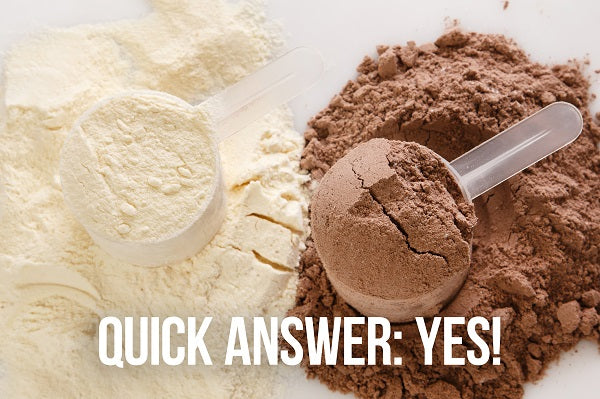Quick answer:
Yes, protein powder can expire due to Maillard browning - the breakdown of lysine, a key amino acid in protein powders. To check if your protein powder has expired, smell or taste a small amount and trust your senses.
For more details, read on!
If you use protein powder as a supplement to help fill in occasional gaps in your diet, there’s a strong chance that these tubs of powder have a habit of sticking around for long stretches of time. When you go to dig one out, you might very well find that the expiration has long since come and gone.
What then? Does protein powder really expire? How do you know when your protein powder is too old to use?
A Primer on Supplement Expiration Dates
In order to answer this question properly, it’s important that you understand one key fact about all packaged foods: expiration dates are an estimate. Actually, that estimated date isn’t even based on when the product is likely to spoil.
Instead, it’s based on how long it takes for the flavor and texture of the food to change. So, right away one conclusion becomes clear. The expiration date doesn’t automatically mean that your protein powder is bad or unsafe to use.
In fact, since protein powder is so dry, the chances of it going rancid or growing bacteria are small - unless you are storing it in a steamy or humid place. Still, there are other things to consider.

Less Lysine
Although the term is generally used in the singular, the reality is that there are lots of different types of protein out there, characterized by their amino acid profiles.
When a protein contains all of the essential amino acids that your body cannot create on its own, it’s described as “complete.” These complete proteins provide your body with absolutely everything it needs to recover from your workouts properly.
Whey and casein – the two most popular protein powders out there – are both complete proteins. But, as these milk-based proteins sit, a process called Maillard browning kicks in.
Put simply, the sugar in the powder reacts with the protein and causes one amino acid – lysine – found in your protein powder to breakdown. Once that happens, your protein is no longer complete.
And this matters because lysine is a very powerful muscle builder. Losing lysine from the protein powder can take away the very reason that you’re taking it to begin with.
A side note about our protein powders is that they are not loaded up with added sugars (our unflavored grass-fed whey shown below contains just 2g of sugar per serving) and therefore may be more resilient compared to other brands. As our protein powders are so natural, they have less sugar and are less likely to go bad.

When Does Protein Powder Go Bad?
If you can’t trust the expiration date, though, how do you know when your protein powder is too old? Trust your senses. If it tastes or smells off, ditch the powder and get a fresh canister.
For the purists, though, you might want to get rid of that batch when the flavor starts to diminish. This is because that’s a good sign that the Maillard browning has started and the powder is beginning to lose potency.
As a general rule, it’s safe to throw the powder away after it’s about a year past it’s sell-by-date.







